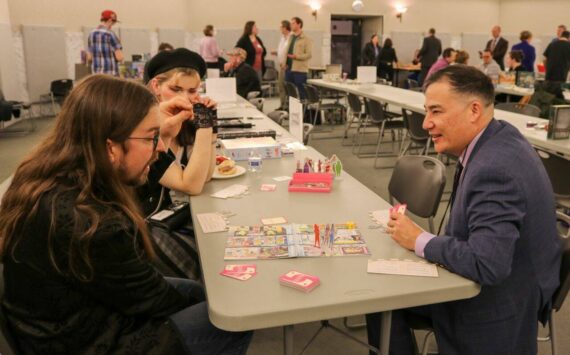“The Tacoma Empowerment Consortium has named three new recipients of microloans through the agencys loan program.Two of the three businesses funded through the TECs Microloan Program are small business start-ups, and the remaining is an existing business expanding its operations.TEC Microloan Program Manager Peter Quist recently announced the three recipients: The Journal of Orthodontic and Oral Maxilla Surgery, The Belgian Wafel Company, and Squeakey Clean Janitorial Service. More loan recipients may be announced in the near future, Quist said.The journal, or JOOMSA, is owned by Cynthia Sambataro, and is designed to help assistants in the orthodontic field to obtain continuing educational credits through a magazine and Internet distance learning format. Sambataro has been in the orthodontic field for 14 years, conducting certification and continuing education classes nationwide. She works as the journals editor in chief.Quist said Sambataro began her business plan at the end of 1998 and was approved for TEC funding by the end of May. The business really began in October, Quist said. He noted that the TEC microloan was the only source of funding for JOOMSA.Quist said JOOMSA has one employee in addition to Sambataro, with assistance from her parents.Quist called the journal a great idea, and added that faced with the cost of going back to school or attending seminars, being able to obtain required continuing education credits through distance learning by mail or through the Internet, was more convenient and cost effective.She has a strong background in this area and knows the industry, Quist said of Sambataro. Quist said the curriculum for JOOMSA is approved by the Dental Assisting National Board quarterly.The Belgian Wafel Company owned by Diann and Jean Pierre Scherer, produces Belgian waffles at the companys Freighthouse Square location, to sell them at retail cart locations in shopping malls. Their first cart located at SeaTac Mall. The companys growth plan is to open a new cart at a different shopping mall each quarter.The company also sells high-end Belgian food products including coffee and chocolates at their retail locations.Quist said the Scherers had been working since May with the TEC and SCORE, the Service Corps of Retired Executives, a national volunteer group that provides free business counseling at the Business Assistance Center in downtown Tacoma. The center houses TEC, SCORE and Small Business Administration offices as well as a resource center for businesses or those interested in starting a business.Squeakey Clean Janitorial Service, owned by Richard and Regina Robinson, operates out of the William M. Factory Small Business Incubator near the University of Washington Tacoma campus.Quist said Squeakey Clean has been in business for about five years and is expanding their facility cleaning capabilities to handle additional clients. The company is adding both equipment and employees through the TEC funding, Quist said. An additional van with a ramp and a buffing machine, along with two new employees were included in the companys plans, Quist said.They have a successful track record, Quist said. They have more demand than they can fill now.Quist said the Robinsons came to the TEC Microloan Program through the auspices of Neil Delisanti, business development specialist for the Small Business Development Center.The TEC Microloan Program will be spun-out early this year to another organization as a result of federal funding for the Strategic Planning Community program being left out of the budget for 2000. The TEC was to have been awarded $3 million this month, along with technical support and assistance under the SPC program proposed by Vice President Al Gore. The program was to have been funded through the U.S. Department of Housing and Urban Development.During its operation, the TEC Microloan Program has made 25 loans in four years. Close to $500,000 has been lent in the program, with about a quarter of that amount coming from funds repaid from recipients.One of the things behind the program is access to capital for individuals unsuccessful in obtaining credit from traditional sources, Quist said. I wish them success.”
Tacoma Empowerment Consortium Names Three New Microloan Recipients
Tags: Al Gore, Business Assistance Center, business development specialist, Cynthia Sambataro, Dental Assisting National Board, Diann Scherer, distance learning, editor in chief, Factory Small Business Incubator, food products, Internet distance learning format, Jean Pierre Scherer, JOOMSA, journals editor, Microloan Program Manager, Neil Delisanti, Peter Quist, Regina Robinson, retail cart locations, Richard Robinson, SeaTac Mall, Service Corps of Retired Executives, Small Business Administration, Small Business Development Center, Squeakey Clean Janitorial Service, Tacoma Empowerment Consortium, TEC, The Belgian Wafel Company, U.S. Department of Housing and Urban Development, University of Washington Tacoma, University of Washington Tacoma campus, USD, Vice President




